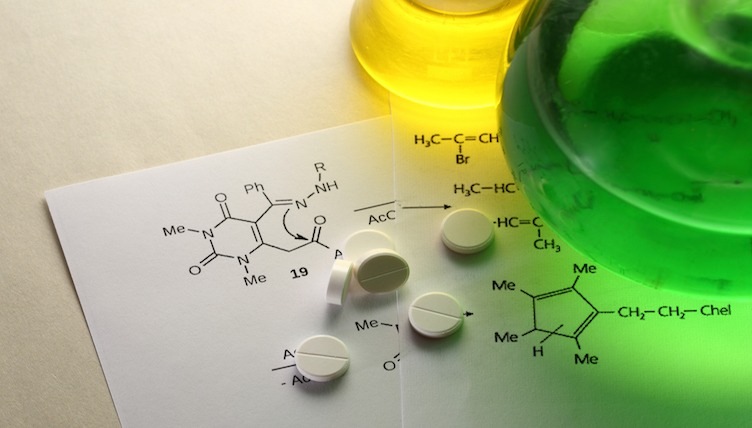Small-Molecule APIs: New Drug Approvals in 2022
Small-molecule drugs have dominated recent new drug approvals, accounting for almost three-fourths of new drug approvals by the FDA. As we near the end of 2022, have small molecules continued to hold their own? Which drugs made the mark?
Overall new drug approvals down thus far in 2022
The end of a year often sees a flurry of action by the US Food and Drug Administration (FDA) in terms of completing reviews of applications for new drugs, so the final tally for new drug approvals is not yet in, but thus far in 2022 (as of mid-December 2022), approval of small-molecule drugs specifically and new drugs overall are off the pace of recent years.
,Thus far in 2022 (as of mid-December 2022), FDA’s Center for Drug Evaluation and Research (CDER) has approved 32 new molecular entities (NMEs) and new therapeutic biologics. These approvals do not contain vaccines, allergenic products, blood and blood products, plasma derivatives, cellular and gene therapy products, or other products approved by the FDA’s Center for Biologics Evaluation and Research. The 32 new drugs approved thus far in 2022 by FDA’s CDER are well off the pace of recent years, including last year (2021), when FDA’s CDER approved 50 NMEs and therapeutic biologics. In 2020, FDA’s CDER approved 53 new drugs, which was the second highest level of new drug approved in a given year in the past decade, except for 2018 when 59 new drug were approved.
Small-molecule new drug approvals also down thus far in 2022
In terms of product mix, the pace of small-molecule new drug approvals by FDA’s CDER is also down thus far this year. As of mid-December 2022, FDA’s CDER had approved 20 new small-molecule drugs, or 63% of the 32 total new drug approved thus far in 2022. That 63% is down from the approximate 75% share of new small-molecule drug approvals in recent years. In 2021, of the 50 new drugs approved by FDA’s CDER, 36, or 72%, were small molecules. In 2020, 75% or 40 of the 53 new drugs approved were small molecules. In 2019, it was 79%; in 2018, it was 71% and 74% in 2017.
Big Pharma’s small-molecule new drug approvals also off the pace in 2022
With the total new drug approvals and number of small-molecule drug approvals down thus far in 2022, it is not surprising that the number of new small-molecule drug approvals by the large bio/pharmaceutical companies is also down compared to recent years. Thus far in 2022, the large bio/biopharmaceutical companies have accounted for only 25% of small-molecule new drug approvals compared to 36% for the full-year 2021.
Thus far in 2022, the large bio/pharmaceutical companies have had only five small-molecule new drug approvals, compared to 13 in the full-year 2021. Thus far in 2022 (as of mid-December 2022), Bristol-Myers Squibb (BMS) had two small-molecule new drug approvals, and Eli Lilly and Company, Novartis, and Pfizer each had one.
BMS received approval for Sotyktu (deucravacitinib) to treat moderate-to-severe plaque psoriasis and for Camzyos (mavacamten) to treat certain classes of obstructive hypertrophic cardiomyopathy, a disease in which the heart muscle becomes thickened. Lilly received approval for Mounjaro (tirzepatide) to improve blood sugar control in adults with Type 2 diabetes. Novartis received approval for Pluvicto (lutetium (177Lu) vipivotide tetraxetan), a radiopharmaceutical to treat prostate cancer. Pfizer received approval for Cibinqo (abrocitinib) to treat refractory, moderate-to-severe atopic dermatitis. (eczema).
Small bio/pharma companies dominate new small-molecule drug approvals
Small to mid-sized companies have dominated new small-molecule drug approvals thus far in 2022. As of mid-December 2022), small-to-mid-sized companies accounted for 75%, or 15 of the 20 new small-molecule drugs approved thus far by FDA’s CDER in 2022, up from last year’s (2021) levels. For the full-year 2021, small companies accounted for 23, or 64% of the new small-molecule drugs approved.
Rare diseases and oncology were leading therapeutic areas for new small-molecule drug approvals in 2022. Oncology small-molecule new drug approvals were: Mirati Therapeutics’ Krazati (adagrasib) for treating KRAS G12C-mutated locally advanced or metastatic non-small cell lung cancer; Rigel Pharmaceuticals’ Rezlidhia (olutasidenib) for treating relapsed or refractory acute myeloid leukemia with a susceptible isocitrate dehydrogenase-1 (IDH1) mutation; and Taiho Oncology’s Lytgobi (futibatinib) to treat intrahepatic cholangiocarcinoma (bile duct cancer) harboring fibroblast growth factor receptor 2 (FGFR2) gene fusions or other rearrangements. Taiho Oncology is a subsidiary of Taiho Pharmaceutical Co., Ltd. which is part of Otsuka Holdings.
In rare diseases, Alnylam Pharmaceuticals received approval for Amvuttra (vutrisiran) to treat polyneuropathy of hereditary transthyretin-mediated amyloidosis, a rare autosomal disease. Marinus Pharmaceuticals got the nod for Ztalmy (ganaxolone) to treat seizures in cyclin-dependent kinase-like 5 deficiency disorder, a rare neurodevelopmental condition. CTI BioPharma received approval for Vonjo (pacritinib) to treat a rare bone marrow disorder, intermediate or high-risk primary or secondary myelofibrosis in adults with low platelets. Agios Pharmaceuticals gained approval for Pyrukynd (mitapivat) to treat hemolytic anemia in pyruvate kinase deficiency, a rare genetic disorder characterized by the premature destruction of red blood cells.
Small to mid-sized companies also received approval for new small-molecule drugs in broader and other disease areas. Dermavant Sciences received approval for Vtama (tapinarof) to treat plaque psoriasis. Dermavant Sciences is one of the “Vants” or wholly owned subsidiaries of Roivant Sciences, a New York-based bio/pharmaceutical and healthcare technology company. Roivant Sciences consists of multiple wholly owned or majority-owned biopharmaceutical subsidiaries (so-called “Vants”), each focused on a different disease area. The company employs a “hub and spoke” model for research and development, whereby each biopharmaceutical subsidiary functions as an independent entity (“spoke”) using shared resources from the parent (“hub”). Other Vants consist of technology-based platforms that support the operations of the bio/pharmaceutical Vants.
Idorsia received approval for Quviviq (daridorexant) to treat insomnia. Mallinckrodt received approval for Terlivaz (terlipressin) to improve kidney function in adults with hepatorenal syndrome, a form of impaired kidney function. Amylyx Pharmaceuticals received approval for Relyvrio (sodium phenylbutyrate/taurursodiol) to treat amyotrophic lateral sclerosis, commonly referred to as Lou Gehrig’s disease.
Two companies received the okay for new small-molecule anti-infectives. Phathom Pharmaceuticals’ Voquezna (vonoprazan, amoxicillin, and clarithromycin) was approved to treat Helicobacter pylori infection, which affects the stomach. Mycovia Pharmaceuticals got the nod for Vivjoa (oteseconazole) to reduce the incidence of recurrent vulvovaginal candidiasis.
In other new small-molecule drug approvals, Santen Pharmaceutical received approval for Omlontio (omidenepag isopropyl ophthalmic solution) to reduce elevated intraocular pressure in patients with open‑angle glaucoma or ocular hypertension. Guerbet got the nod for Elucirem (gadopiclenol), a contrast agent to detect and visualize lesions, with MRI, with abnormal vascularity in the central nervous system and the body








